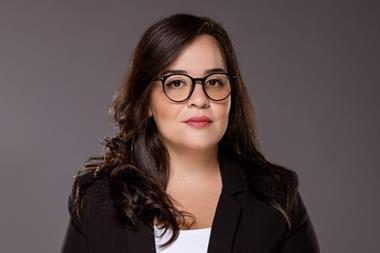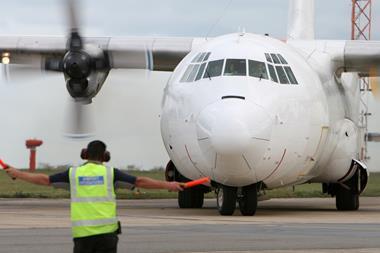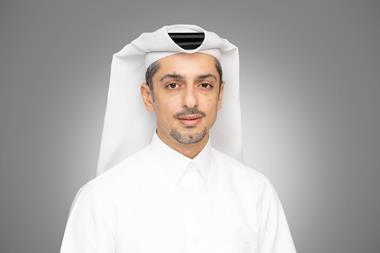Since its establishment in 1973, Chapman Freeborn has developed into one of the largest and best-known aircraft charter brokers.
The UK-headquartered company was originally set up to market Alaska International Air’s Hercules freighter fleet, which comprised five aircraft at the time.
Today, Chapman Freeborn operates on a global scale — with offices in North America, Europe, Africa, Asia and Australia — and carries out around 25,000 flights each year for airfreight, passenger and humanitarian operations.
In 2019, the group and its subsidiaries were acquired by aerospace firm Avia Solutions Group (ASG). Russi Batliwala, the company’s chairman, says it was “the perfect fit for us”.
Having worked at Chapman Freeborn for 33 years, Batliwala has witnessed some of the company’s most significant milestones, particularly during his time as chief executive, from 2009, when he oversaw “an exciting period of growth and expansion”.
Branching out
“We realised that our core third party air charter broking activities alone were not enough for our clients, our own growth expectations and for our future financial stability,” he explains. “At the same time, the competition was growing.”
The solution? “In order to better control our future, we took the decision to diversify the business and to invest.”
For example, in 2006, Chapman Freeborn Germany launched its specialist on-board courier (OBC) service, which offers door-to-door solutions for time-critical shipments.
“We were the first of now many to start an OBC business,” says Batliwala. “It fits perfectly, with total synergy, toour cargo charter business.”
Now, Chapman Freeborn OBC operates as a global business from its offices in Cologne, Hong Kong and Los Angeles.
Under Batliwala’s leadership, Chapman Freeborn has since acquired other companies that all have “strong synergies” with the core air chartering business.
For example, the company has held shares in Magma Aviation, which manages and contracts a growing fleet of B747 freighters, since its establishment in 2010. In 2017, Chapman Freeborn increased its stake in Magma Aviation to become the majority shareholder and help support its long-term growth plans.
Chapman also acquired the majority of shares in animal transportation specialist firm Intradco Global in 2014, allowing it to “expand our product portfolio further”.
Most recently, in 2020, the broker acquired Arcus Air Logistics and Arcus Air OBC, which offer air cargo charter and on-board courier services primarily to the automotive industry, and also owns and operates two Dornier 228-212 aircraft, as well as “chartering a variety of additional aircraft”.
Additionally, the company has significantly increased its humanitarian project presence since its work in Ethiopia in the 1970-80s — so much so that in October Daniel Carriett took up the newly created role of group humanitarian cargo director to manage the company’s response to global crises, including the Covid-19 pandemic.
Batliwala notes that leading the expansion of the company was not easy and he credits his team for making the changes possible.
“It was a tremendous amount of hard work that I most certainly was not able to do on my own,” he says. “I have been fortunate enough to have had some very talented people working with me.
“We have not only grown our senior management team organically but also employed some exceptional external group directors who have made a great impact on the business.”
Batliwala says that his most significant achievement as chief executive was leading the sale of Chapman Freeborn Group to ASG in 2019.
“Joining forces with Avia Solutions Group has provided us with a greater level of business scale, resources and expertise to accelerate growth and deliver our services to an even wider client base — all while preserving ourcompany culture and ongoing commitment to charter market innovation,” he says.
“We are today a much stronger organisation, with a parent company that is continuously looking at ways to invest and grow the business.”
New lead
Batliwala is now chairman of Chapman Freeborn, having been appointed to the role in October.
He welcomes his new position because “every business at some stage needs change at the top to keep energising, to create new ideas and to continue developing.
“I am extremely proud to be the chairman and looking forward to the company’s future,” he says.
Eric Erbacher, former director of charter services and ACMI at Cargolux Airlines and former regional director Asia at Chapman Freeborn, has rejoined the company to succeed Batliwala as chief executive.
Although Batliwala will be very much involved in the business in his role of chairman, he says the move will enable him to take a step back and have more oversight than when he was chief executive.
“I have been heavily involved in the day-to-day business of the group for all these years, particularly in the cargo charter business,” he says. “The role of chairman will enable me to take a step back from the daily brokerage and allow me to concentrate on developing the group at a higher level.
“It will allow me to look at the business from another perspective and give me the time needed to concentrate on acquisitions, organic growth and other key areas that I really enjoy focusing on outside of our day-to-day charter work.
“I have a clear mandate from our owners to grow the business organically and through acquisitions.
“We are talking to various companies that match our group’s own niche businesses. However, owing to the ongoing nature of the negotiations, and non-disclosure agreements, I am unable to share more details.”
He continues: “What I can say is that we are actively looking to acquire complementary businesses to strengthen and to grow both parties. There is, I believe, an opportunity and need to consolidate certain specialised businesses on a global scale.”
Despite taking a step back, Batliwala says he will be on hand to help Erbacher, the company’s directors and managers to achieve the group’s goals.
“Our new owners are very much growth-focused and additional acquisitions are part of our plans,” he explains. “We are also currently investing in strengthening our operations in North America and we are actively recruiting.”
Batliwala adds that, in addition to North America, the company is shifting its focus towards growth in Asia.
“With the return of Erbacher to the group as chief executive, we have someone with years of experience, knowledge and understanding of the culture and charter business in Asia,” Batliwala explains.
“He spent several years working in China previously and has taken on the opportunity himself to continue to grow and strengthen this important region for the group. With his experience [as former regional director Asia at Chapman Freeborn], we have the right person in place to move the business forward in this important region.”
In addition, Batliwala says, Magma Aviation’s growing fleet of B747 freighters — as well as capacity from B737Fs and Airbus A321Fs from elsewhere in ASG — has opened up many new opportunities for Chapman Freeborn to do business in Asia.
“For example, we are now able to offer and provide solutions not only for long-haul maindeck capacity into Europe, we can also connect to our group’s Europe-based narrowbody freighters to do the last mile of flying to destinations in Europe,” he says.
Reflection
Now in his current and most senior role, Batliwala takes a moment to reflect on his 33-year journey at Chapman Freeborn.
He joined as a trainee in 1987 in Frankfurt, after responding to “a very small ad in a big newspaper that said: Aviation company needs a pair of hands to help”, he recalls.
Chapman Freeborn Germany had opened just six years before, in 1981.
“I worked in a small office with a team of just three people. In 1990 I was made managing director and started to help grow the German business.”
The mid-1990s saw Chapman Freeborn expanding to establish a presence in Belgium, Poland, Singapore, United Arab Emirates (UAE) — and the US, which Batliwala was involved in.
“At the time, I needed a change,” he says, recalling the opportunity he was given to help the company grow across the pond.
“I arrived in Atlanta in 1995 with a suitcase and two plastic bags with various trade books and magazines. After six months in a serviced office, myself and the first US members of staff moved to our own offices at Hartsfield Airport in Atlanta.”
He proudly notes that today Chapman Freeborn also has bases in Fort Lauderdale, Los Angeles and will soon open a branch in the northeast region of the US.
Batliwala’s next key role, in 1996, was back in Germany, where he was made group cargo director.
In 1999, he set up an office in Sharjah in the UAE. He says it has been “an incredible asset to the group ever since”.
He adds: “At one point in 2006 we had in excess of 100 employees, warehousing and a second office in Dubai, operating more than 40 scheduled charters in the Middle East region for major clients, every week.”
Fast-forward to 2017: Batliwala celebrated his 30-year anniversary at a“tear-jerking” party thrown by his colleagues.
The event, he says, was held inside an open-nosed B747 freighter — complete with food, drinks and a sticker on the fuselage that read: Russi, Happy 30 Years With Chapman Freeborn.
Looking at the effects of the pandemic on the air charter sector, Batliwala says that despite it being a negative situation overall, it brought huge opportunities to an industry that was “suffering”.
He explains that before the pandemic, the air charter sector was competing against bellyhold capacity.
“Huge amounts of scheduled passenger aircraft belly capacity was available and the freighter air charter industry was fighting for opportunities,” he says.
He hopes that, even as passenger services gradually return, forwarders will continue to push capacity on air charters, rather than reverting to bellyhold capacity.
“I would like to think that shippers who previously relied on forwarders to only provide bellyhold capacity are now experiencing the advantages that freighters have to offer — and have offered — throughout the pandemic.
“Just maybe, when passenger services [and bellyhold capacity] return in full, some of the good experiences [from the benefits of air charters] will be remembered.”
He warns that if bellyhold cargo capacity is continuously chosen over air charter capacity after the pandemic, as aviation operations return to previous levels the charter industry could end up “reverting to its previous state of relying on the world’s ups and downs for ad-hoc work”. Ultimately, time will tell.










